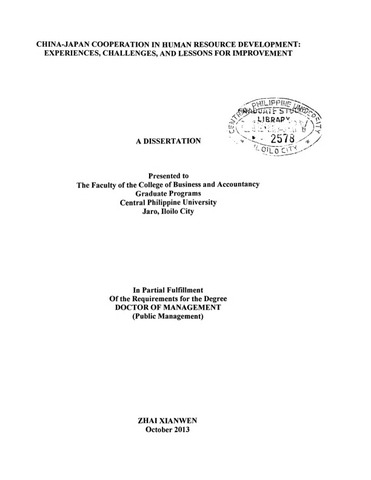China-Japan cooperation in human resource development: Experiences, challenges, and lessons for improvement

Page views
564Date
2013Author
Thesis Adviser
Defense Panel Chair
Share
Metadata
Show full item record
Abstract
Foreign students in Japan have received experiences and skills through the Chino-Japan Exchange system. Japan has given the foreign students language skills, basic education, work experience and good opportunities to start their own career. There were two types of mechanisms adopted in receiving groups of foreign trainees in Japan. One was a receiving mechanism for the Chamber of Commerce and Industry, trade unions, the small and medium-sized enterprise groups, occupation training organizations and agricultural cooperatives, and agricultural technical cooperation corporation; another is a receiving mechanism for the small and medium enterprises group members.
This study was conducted in order to examine the Chino-Japan Cooperation in human resource development, describe the experiences and challenges encountered by program participants and generate lessons that can be used for the improvement of the program.
The analysis was based on information derived from secondary sources, official documents and statistics available on-line. Data were also collected from key informants who willingly provided information. The author’s own files, observations and experiences during his involvement in the program were also used as references.
The process and result of program implementation was analyzed according to the research objectives and study framework, particularly, the Structure-Conduct-Performance (SCP) model. Based on this model, it is assumed that the performance or outcome of any intervention, project or program is dependent on the organizational structure, the inputs and the internal and external environment. The effect of the structure on performance, however is assumed to depend on how the intervention was implemented or conducted. Effective conduct/process is expected to result to good performance. The assumed relationship between structure and conduct, and between conduct and performance, however, was analyzed statistically because of limited statistical data. Instead qualitative analysis was employed, using secondary data, documents, reports, and information provided by key informants.
Japan started the implementation of the Foreign Trainee Skills Training System Concept in 1991, in collaboration with foreign countries, such as China, North and South Korea and many developing countries. This study focused mainly on the Chinese experience.
The training was conducted in Japanese. It was funded jointly by the sending country, in this study, China and Japan, or it could be a joint venture with the enterprise, or with foreign enterprises, civil servants, or central bank staff. There were two types of mechanisms adopted in receiving groups of foreign trainees in Japan. One was a receiving mechanism for the Chamber of Commerce and Industry, trade unions, the small and medium-sized enterprise groups, occupation training organizations and agricultural cooperatives, and agricultural technical cooperation corporation; another is a receiving mechanism for the small and medium enterprises group members.
Description
Abstract only
Suggested Citation
Zhai, X. (2013). China-Japan cooperation in human resource development: Experiences, challenges, and lessons for improvement (Unpublished Doctoral dissertation). Central Philippine University, Jaro, Iloilo CIty.
Type
DissertationSubject(s)
Department
School of Graduate StudiesDegree
Doctor of Management major in Public ManagementShelf Location
GSL Theses 658.0072 Z612
Physical Description
xii, 90 leaves
Collections
The following license files are associated with this item:


